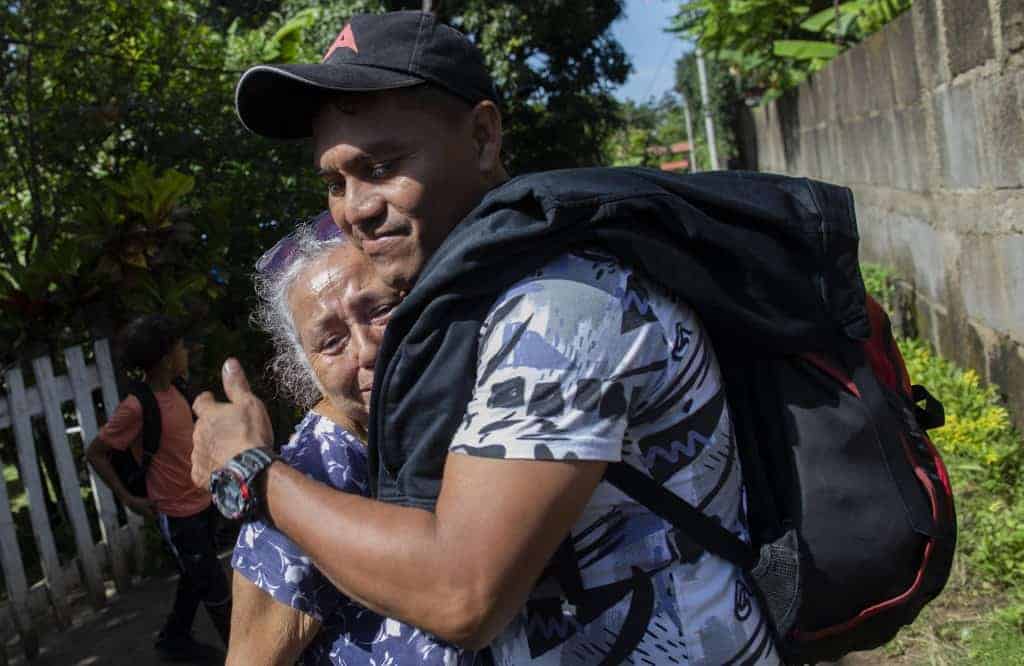José Galeano is about to embark on the most important journey of his life and he is afraid. He pawned his house in Nicaragua, took out a loan and paid smugglers to start a dangerous journey to the U.S. border.
After working as a farmer, gardener and bricklayer, this 35-year-old former veterinary student is one of thousands of migrants fleeing Nicaragua, the second poorest country in Latin America. There is “little work, little pay. There is no opportunity,” he laments on the day of his departure.
Nicaraguan migration has skyrocketed in the last year in the face of the crippling cost of living, lack of work and the closing of spaces for dissent.
Galeano is leaving for the United States with a brother and two cousins. “We are leaving with the hope of arriving and working,” he tells AFP in his humble home in Managua. He leaves behind a little girl, his mother and grandmother.
“We made a loan, we pawned the land, the house, and with that we are leaving (…) I have never left so long and well (I am) scared, afraid,” he says.
His dream is to return with money to start a bakery in Managua.
In Galeano’s house, family and friends gather to say goodbye and embrace him in tears.
Only the Old People Left
According to local media citing relatives of victims, in 2022 at least 40 Nicaraguan migrants died from suffocation, drowning or in traffic accidents on their way to the United States.
Hundreds of men, women and children, with only a backpack in hand, gather at different points in Managua to board buses offering tourist “excursions” to Guatemala.
It is the first stage of a journey that involves paying between $2,000 and $5,000 to a “coyote” to get from Guatemala to the United States. This year at least 60 residents of the Galeano district emigrated.
“Nicaragua is going to be left alone,” lamented Roger Sanchez, a 60 year old farmer. Three of his children have migrated to the United States and a fourth has plans to leave.
A 57% of Nicaraguans are willing to migrate, especially to the United States, according to a survey by the Costa Rican firm Cid Gallup carried out between September and October, reported by the digital newspaper Confidencial.
The three main reasons for migration are “lack of employment”, the “high cost of living” and “corruption in the government”, the survey indicated.
Days and Nights in Line
The exodus causes crowds at the immigration offices in Managua, where thousands of people coming from all over the country to process their passports sleep outdoors on mattresses or cardboard placed on the sidewalk, and even in hammocks.
The departure of Nicaraguans is not officially registered, although the Immigration and Foreigners Office reported on its website that between September 17 and October 7 alone 20,192 passports were issued, including nearly 2,000 for minors.
President Daniel Ortega, who has ruled Nicaragua since 2007, assured last week that the massive migration is due to sanctions imposed by the United States on Nicaragua and other countries such as Cuba and Venezuela.
Washington has sanctioned since 2018 more than 30 relatives and close associates of Ortega and companies linked to the government.
“Keep putting sanctions and more immigrants will go to the United States no matter how much they want to close the doors on them,” Ortega said.
Data from the U.S. Border Patrol (CBP) indicate that in fiscal year 2022, 164,600 undocumented Nicaraguans were apprehended at the border, three times more than in the previous period.
Nicaragua, with 24% of its 6.5 million inhabitants affected by poverty, according to official data, has been mired in a political and social crisis since the 2018 anti-government protests, amid growing authoritarianism.
For Manuel Orozco, director of the migration, remittances and development program of the Washington-based Inter-American Dialogue analysis center, migration also has political reasons: “The situation of persecution in Nicaragua is so bestial that (people) better risk traveling than staying and exposing themselves to more repression,” he assures.
More than 200 opponents are imprisoned, and some 2,000 civil organizations have been declared illegal in Nicaragua.






